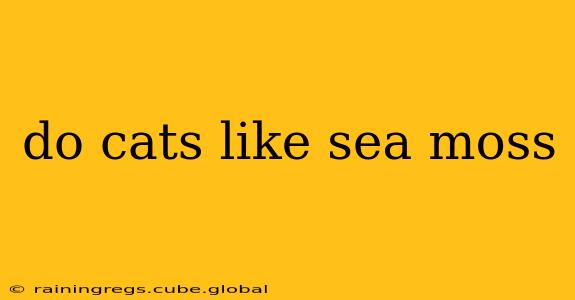Do Cats Like Sea Moss? A Vet's Perspective on Feline Nutrition and Seaweed
The question of whether cats like sea moss is a bit more nuanced than a simple yes or no. While some cats might show curiosity towards this seaweed, it's crucial to understand that sea moss is not a suitable or recommended part of a cat's diet. This isn't about taste preference; it's about nutritional needs and potential dangers. Let's dive into why.
What is Sea Moss?
Sea moss, also known as Irish moss, is a type of red seaweed with a gelatinous texture. It's gaining popularity as a human dietary supplement due to its purported health benefits, including high mineral content. However, these benefits are not relevant to felines and can even be detrimental.
Nutritional Needs of Cats vs. Sea Moss Content
Cats are obligate carnivores, meaning their bodies are designed to thrive on a diet primarily consisting of meat. Their nutritional requirements are significantly different from those of humans or herbivores. Sea moss, while containing some minerals, lacks the crucial nutrients cats need to survive and flourish:
- Taurine: An essential amino acid vital for feline heart and eye health, not found in significant amounts in sea moss.
- Arginine: Another essential amino acid crucial for various bodily functions.
- Protein: Cats require high-protein diets for muscle growth and overall health; sea moss is very low in protein.
- Fat: Essential fatty acids are vital for a cat's coat and skin health. Sea moss is not a significant source of these fats.
Feeding a cat a diet primarily or even partially based on sea moss can lead to severe nutritional deficiencies, resulting in serious health problems.
Potential Dangers of Sea Moss for Cats
Beyond the lack of essential nutrients, there are potential dangers associated with feeding sea moss to cats:
- Digestive upset: Sea moss can cause diarrhea, vomiting, or other gastrointestinal issues in cats, particularly if ingested in large amounts.
- Mineral imbalances: While sea moss contains some minerals, it may not provide them in a balanced or bioavailable form for cats, potentially leading to imbalances.
- Contamination: Seaweed, like other harvested products, may be contaminated with heavy metals or other harmful substances.
Can Sea Moss Be Used Topically on Cats?
This is a question that often arises. While the ingestion of sea moss is strongly discouraged, there is limited information regarding topical application. It's best to avoid any topical application of sea moss without consulting your veterinarian first. Any skin irritation or allergic reaction could be harmful to your pet.
What Should I Feed My Cat Instead?
Focus on providing your cat with a high-quality, nutritionally balanced commercial cat food formulated to meet the specific needs of felines. Consult your veterinarian about the best food options for your cat's age, breed, and any health conditions. You can also discuss the addition of healthy supplements, if needed, under professional guidance.
Always prioritize your cat's health and well-being by providing them with a diet suitable for their biological needs. Never introduce new foods, including sea moss, without first consulting your veterinarian. They can offer personalized advice and ensure your cat receives the optimal nutrition to thrive.
